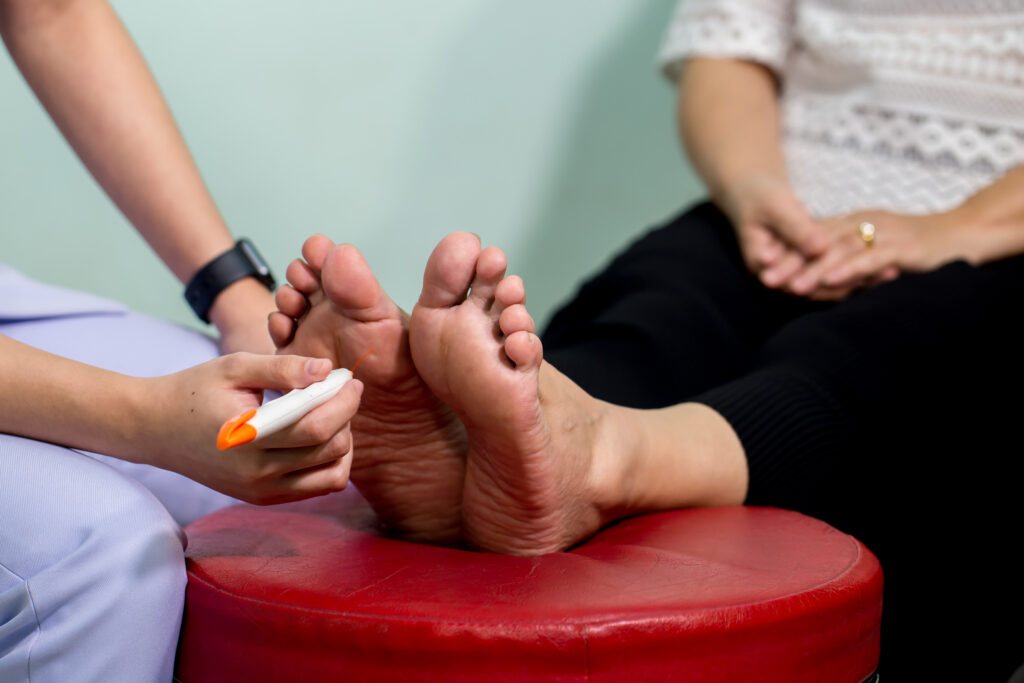Introduction:
Foot care is a critical aspect of diabetes management, yet it is often overlooked. People with diabetes are at a higher risk for foot complications due to poor circulation and nerve damage, which can lead to serious issues if not properly managed. In this blog, we’ll explore why foot care is essential for people with diabetes and how to prevent complications.
Main Body:
- Why Diabetes Affects Foot Health
Diabetes can cause damage to the nerves (diabetic neuropathy) and blood vessels, especially in the legs and feet. Neuropathy can result in a loss of sensation in the feet, making it difficult to detect injuries such as cuts, blisters, or sores. Poor circulation caused by diabetes can slow the healing process and increase the risk of infections. In severe cases, untreated infections can lead to foot ulcers, gangrene, or even amputation.
Foot complications are more common in people with long-standing diabetes, especially those who have poor blood sugar control, high blood pressure, or high cholesterol. However, with proper care, these risks can be minimized.
- Daily Foot Care Tips for People with Diabetes
Proper foot care is essential for preventing complications. Here are some tips to keep your feet healthy:
- Inspect Your Feet Daily: Check your feet every day for cuts, blisters, redness, swelling, or other signs of injury. Use a mirror or ask someone to help you if you have difficulty seeing the bottoms of your feet.
- Wash and Moisturize: Wash your feet daily with warm water and mild soap. Be sure to dry your feet thoroughly, especially between the toes, to prevent fungal infections. Use a moisturizer to keep your skin soft and hydrated, but avoid applying lotion between the toes, as excess moisture can encourage fungal growth.
- Trim Nails Carefully: Trim your toenails straight across and file the edges to prevent ingrown nails. Avoid cutting your nails too short, as this can lead to infections.
- Wear Proper Footwear: Always wear shoes that fit well and provide adequate support. Avoid walking barefoot, even indoors, to reduce the risk of injury. If necessary, consider wearing custom orthotic shoes designed for people with diabetes.
- Protect Your Feet from Extreme Temperatures: Keep your feet warm in cold weather, and avoid using heating pads or hot water bottles directly on your feet, as neuropathy may prevent you from feeling burns or injuries.
- Managing and Preventing Foot Complications
Preventing foot complications involves more than daily care. It’s essential to manage your diabetes effectively by keeping your blood sugar levels within your target range. This helps protect your nerves and blood vessels from further damage.
Regular check-ups with a podiatrist (foot specialist) are important for early detection and treatment of any foot issues. If you notice any cuts, sores, or infections that are not healing, contact your healthcare provider immediately.
Foot ulcers are one of the most serious complications of diabetes, and they can develop even from minor injuries. If left untreated, ulcers can become infected and lead to more severe issues, such as gangrene. Early treatment is crucial for preventing complications.
- The Role of Professional Care
Professional foot care plays a vital role in managing diabetes. A podiatrist can identify and treat issues early on, such as corns, calluses, and nail problems, which can prevent more serious complications. Regular foot exams should be a part of your overall diabetes care plan.
If you experience any numbness, tingling, or changes in skin color or temperature, report these symptoms to your healthcare provider immediately. These may be signs of nerve damage or circulation problems that require medical attention.
Conclusion:
Foot care is an essential part of managing diabetes. By taking simple steps to care for your feet every day, you can prevent complications and protect your long-term health. At Credo Health, we provide personalized support to help you manage every aspect of your diabetes care, including foot health. Let’s work together to keep your feet healthy and reduce the risk of complications.

